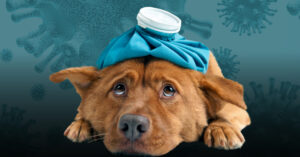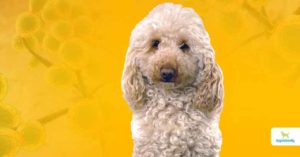In the summer of 2018, the US Food and Drug Administration (FDA) issued a warning.
They alerted pet owners about the potential for heart disease in the form of DCM (dilated cardiomyopathy) in dogs on certain diets … diets that may be deficient in taurine.
Everyone panicked … but was this panic warranted?
The Tale Of Taurine
Taurine is an amino acid found mainly in meat. Unlike other amino acids, which are used mainly to build proteins, taurine is a loner. It has many special functions, including:
- It’s a component of bile, which breaks down dietary fat.
- It’s vital for the proper function of muscles (especially the heart), eyes, brain, and the immune system.
- It has beneficial antioxidant and anti-inflammatory properties.
Dogs manufacture their own taurine from the sulfur-containing amino acids methionine and cysteine. But, with advancing age, taurine production decreases.
The first inkling about taurine’s importance came in the 1980s. Researchers at UC Davis discovered that taurine deficiency was impacting cats. Thousands of cats were going blind. Some were even dying from a heart condition called dilated cardiomyopathy (DCM).
This happened because pet food companies were making ingredient substitutions. They substituted more and more plant proteins, such as soybeans or corn gluten meal, in place of real meat.
The trouble is … soybeans and corn are poor sources of sulfur-containing amino acids. They also contain zero taurine.
Unlike dogs, cats (and ferrets) must consume taurine in the diet and cannot produce their own.
So the manufacturers started supplementing all cat foods with taurine. The epidemic then faded away (although DCM can still occur, unrelated to diet). Pet food makers saw no reason to add taurine to dog foods, so they chose not to incur the added expense.
However, DCM is common in dogs, especially large breeds. And there is such a thing as taurine-deficiency DCM in dogs; it was discovered in the 1990s.
Spaniels, Golden Retrievers, Newfoundlands … and a handful of other breeds … appear to be genetically predisposed to DCM. It’s also recognized that big dogs produce taurine more slowly than small dogs. This increases their risk of DCM.
RELATED: NEWS: FDA Reports Some Dog Foods May Cause Heart Disease
What The Research Has To Say
Recent research suggests that diet is a factor in less than 20 to 30 percent of dogs with DCM. Some (but not all) of these dogs will improve with taurine supplementation. And that raises even more questions about it!
For one thing, taurine may not even be the real culprit. Taurine production relies on adequate methionine and cysteine in the diet. So the problem may be a deficiency of those amino acids, rather than a lack of taurine itself.
The microbiome may also play a major role in taurine deficiency. This turned out to be the primary factor in cats. The taurine from bile is reabsorbed in the colon … but bacteria can “steal” taurine and prevent this crucial recycling.
Processing may also play a significant role in dogs as well as cats. This has not, to date, been considered or investigated.
Grain-Free And “Boutique” Foods
The FDA reported a link between DCM and “grain-free” dog foods with large amounts of:
- Potatoes
- Legumes
- Exotic proteins
One expert called these “BEG” (Boutique, Exotic and Grain-Free) diets.
The increase in reported taurine-DCM cases caught the FDA’s attention. Not because it was a new concern … but because the dogs weren’t breeds previously known to develop taurine-deficiency DCM.
These included:
- Labrador Retrievers
- Whippets
- Miniature Schnauzers
- Shih Tzu
- A Bulldog and an unspecified number of mixed-breed dogs (and 7 cats).
The FDA said, “potatoes or multiple legumes such as peas, lentils, other pulses (seeds of legumes), and their protein, starch, and fiber,” were the main ingredients of the food in several cases of DCM reported to the agency.
In practical terms, this means that a pet food containing related ingredients … such as “peas, potatoes, pea starch, pea protein, potato protein” could be problematic. This is a common label trick known as “splitting.”
Listing ingredient fractions separately helps a small amount of meat rise to the top … as the ingredients are listed by weight. But, in reality, if they totaled all the plant products, they’d outweigh the meat. This means the food is primarily plant-based.
If the meat is itself is low in taurine, as it is in …
- Beef
- Venison
- Lamb
- Rabbit
- Kangaroo
… that exacerbates the problem in diets with these ingredients.
Interestingly, most vegetarian and vegan dog foods already contain added taurine and carnitine. Evidently, this issue was not hard to anticipate in low- or zero-meat diets.
Manufacturers whose products have been implicated quickly retuned to add supplemental taurine to their foods … but even that may not be enough to correct the problem.
The link between canine DCM and diet is not restricted to exotic meats, potatoes or legumes. Current and past research notes that any of these ingredients may be correlated with DCM:
Animal Products
- Bison
- Duck
- Lamb
- Kangaroo
- Salmon
- Venison
Plant Products
- Barley
- Beet pulp*
- Chickpeas
- Fava beans
- Lentils
- Peas
- Potatoes
- Rice/rice bran**
- Sweet potatoes
- Tapioca
* While it was not named by FDA in this situation … beet pulp is known to decrease taurine status in dogs under some conditions.
** Previous studies found taurine deficiency from eating diets containing rice or rice bran.
RELATED: The Truth About Grain-Free Dog Foods And DCM
Consider All Factors
It’s important to remember that correlation does not equal causation. Just because taurine is a common factor in a bunch of dogs with DCM … it does not mean that taurine deficiency is the sole cause.
Taurine may just be an innocent bystander! Moreover, this list is counter-intuitive, because salmon and duck are high in taurine. Therefore, processing, bioavailability or other factors are also playing a role.
For example, taurine from fish is diminished by heat processing; the loss is about 30 percent.
The FDA claims … food made by small “boutique” manufacturers is more likely to be problematic.
However, in one set of 18 cases, 15 were from foods with “boutique” brand labels … but those brands are owned and produced by some of the world’s biggest pet food manufacturers …
- Purina
- Mars
- Champion
It appears that the size of the pet food company is largely irrelevant. And now the FDA has done irreparable damage to small brands’ reputations … with its premature and inaccurate assessment.
DCM occurs in all kinds of dogs eating all kinds of foods …
- Foods with a simple ingredient list
- Food with a very complex ingredient list
- Homemade diets
- Commercial raw foods.
And while the FDA listed ingredients that have at some point been associated with DCM in dogs … they seem to only be concerned with potatoes and legumes.
It’s very important to note this: Not all dogs with DCM … and not all dogs with very low blood levels of taurine … respond to taurine supplementation.
Many dogs with DCM have perfectly normal taurine levels. A few dogs with low taurine levels can develop DCM … but so can dogs who are eating high-taurine foods.
This implies that taurine itself isn’t the problem (at least in those cases). It could be a lack of methionine, cysteine or any number of completely different factor(s).
One study on taurine in dogs concluded, “there was no clear relationship between low (whole blood taurine) and presence of DCM.”
The Bottom Line
Grain-free dog foods have been safely fed to hundreds of thousands, if not millions, of dogs for many years. The relationship to DCM is far from clear.
The FDA is not recommending a diet change for any dog, as their investigation is ongoing.
The link between diet and DCM is much more complicated than blaming a few ingredients. It’s clear that we need to consider genetics and diet ingredients combined.
Or perhaps the food’s overall content of …
- Methionine
- Cysteine
- L-carnitine
- Taurine
… And other factors like processing are at the root of DCM in these cases.
But at this point, no one – the FDA or anyone else … has any idea which factors are actually problematic. Nor do they know in what amounts or combinations.
Unfortunately, many veterinarians are now recommending grain-based foods … even though there haven’t been all that many cases.
And the chance of a dog developing taurine-related DCM is extremely small.
Grain-based foods have their own (significant) set of problems including:
- Pesticide residues
- Genetically modified organisms (GMOs)
- Toxic byproducts of processing
- Mycotoxins from mold
They also tend to use less expensive, poorer quality animal proteins. You’ll see ingredients like poultry by-products, meat meal and bone meal.
So, what should you do?
Ideally, feed your dog a fresh diet that’s high in animal protein. But at the very least, make sure the food you’re feeding has more meat proteins than plant substitutes.
Don’t forget, you can call the manufacturer and ask questions if you’re uncertain!
Symptoms Of DCM In Dogs
Symptoms of DCM in dogs include:
- Tiring easily
- Excessive panting
- Coughing
- Weakness
- Ataxia (being unsteady on the feet)
If you have any concerns about your dog or the food you’re feeding, talk with your vet about testing. Your veterinarian can submit blood and plasma samples to UC Davis for analysis.
However, as expected, their laboratory has been overwhelmed since the FDA’s announcement. So it could take weeks to get your dog’s results.
Keep Yourself Up To Date
The best place for up-to-date information on brands can be found on Facebook, in the Taurine DCM group.
While there is a great deal of speculation and misinformation in the posted comments … you’ll find a few helpful items. They have a current chart of cases, including breeds, as well as specific brand names. You’ll find these in their Files Section.
It’s way too early to hit the panic button, but it’s certainly good to be aware of this ongoing issue.













